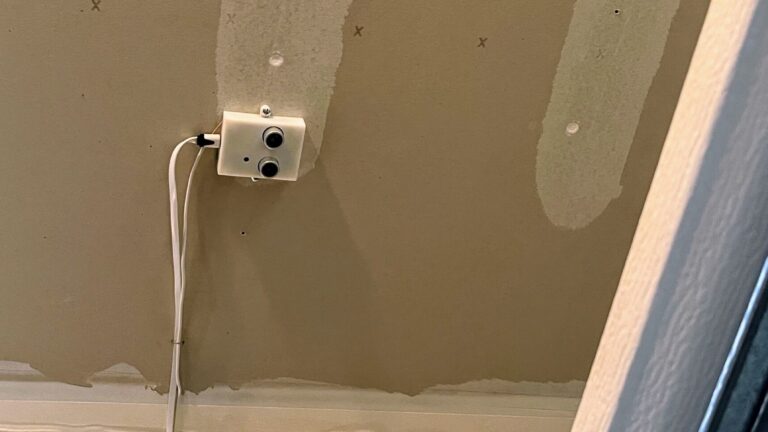I played Half-Life 2 for the first time this year—here’s how it went
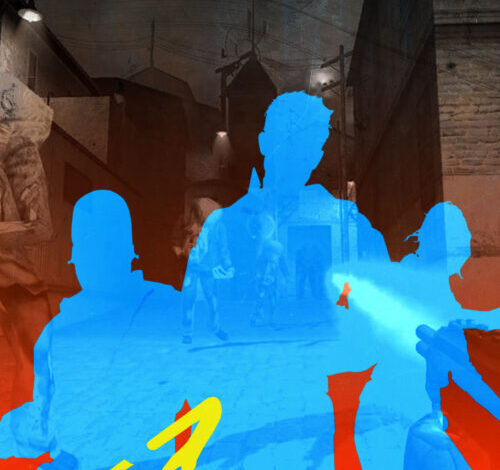
Wake up and smell the ashes, Ms. Washenko.
This article is part of our 20th anniversary of Half-Life 2 series.
Credit:
Aurich Lawson
It’s Half-Life 2 week at Ars Technica! This Saturday, November 16, is the 20th anniversary of the release of Half-Life 2—a game of historical importance for the artistic medium and technology of computer games. Each day up through the 16th, we’ll be running a new article looking back at the game and its impact.
The time has finally come to close one of the most notable gaps in my gaming history. Despite more than a decade of writing about video games and even more years enjoying them, I never got around to playing Half-Life 2.
Not only have I not played it, but I’ve managed to keep myself in the dark about pretty much everything to do with it. I always assumed that one day I would get around to playing this classic, and I wanted the experience to be as close as possible to it would have been back in 2004. So my only knowledge about Half-Life 2 before starting this project was 1) the game is set in the same universe as Portal, a game I love, 2) the protagonist is named Gordon Freeman, and he looks uncannily like a silent, spectacled young Hugh Laurie, and 3) there’s something called the Gravity Gun.
That’s it. I didn’t even know exactly what the Gravity Gun did, only that it existed.
So, the time has come for me to learn what the fuss is all about. I’ve cataloged my off-the-cuff reactions as well as my more analytical thoughts about Half-Life 2, both as a standalone project and as a catalyst for setting new standards in design. But if you’re looking for the TL;DR of whether I think the game holds up, my answer is: it depends.
Beginning a classic with a clunk
A red letter day indeed! Time to experience this iconic piece of video game history. I spend most of the intro sequence in the train station soaking in the atmosphere of the dystopian City 17. A few minutes in, though, I think I’m supposed to sneak past a guard. Because I’m a fugitive trying to escape this freaky Big Brother building, and I swear Barney told me to avoid detection. Instead, the guard immediately sees me and whomps me on the head for not putting a bottle into the trash. Not an auspicious beginning.
I make it to Dr. Kleiner’s lab for a little bit of story exposition. I like this rag-tag group of geniuses and the whole vibe of a secret scientific rebellion. I also appreciate that it’s not a static cutscene, so I can poke around the lab while I listen or observe the characters interacting.
After a failed teleport and getting a crowbar from Barney, I then spend a long time getting shot and dying in a train yard. Like, an embarrassingly long time. Perhaps I was assuming at this early stage that Half-Life 2 would be like Portal with real guns, because I figured this area had to be a puzzle. I’m not sure how I missed the one portion of the environment that I could slip through, but I convinced myself that I was supposed to leap across the tops of the train cars, Frogger style. And Gordon might have many skills, but his jumping leaves something to be desired.
Finally, I realize that there’s a gap in the cars, and I move along. This canal setting is striking, but I keep being unsure which areas of the map I can access. I’ve heard that the level design is one of the most lauded parts of Half-Life 2, but this is proving to be a genuine struggle with the game.
When I played Portal, I sometimes was unsure how to progress, but because that game is presented in the austere confines of a science experiment, I felt like I was supposed to be challenged. In Half-Life 2, though, where there are higher stakes and I’m running for my life, getting stuck just makes me feel dumb and annoyed. And I’m doubly annoyed because this escape sequence would probably feel amazing if I didn’t keep getting lost. Again, not the thrilling start I was hoping for.
Killing a barnacle by feeding it an explosive barrel is a definite high point. I may have cackled. This is the sort of clever environmental interaction I expected to see from the minds that later made Portal.
Headcrabs, on the other hand, are just obnoxious. My dinky little pea shooter pistol doesn’t feel like great protection. What’s a rogue physicist gotta do to get a shotgun?
From airboats to zombies
After a break, I return armed with a renewed determination to grok this game and, more importantly, with an airboat. For 90 percent of the Water Hazard chapter, I am feeling like a badass. I’m cruising in my watery ride, flying over ramps, and watching a silo collapse overhead. Especially in those rare moments when the 2000s electro jams punctuate my fights, I feel like a true action hero.
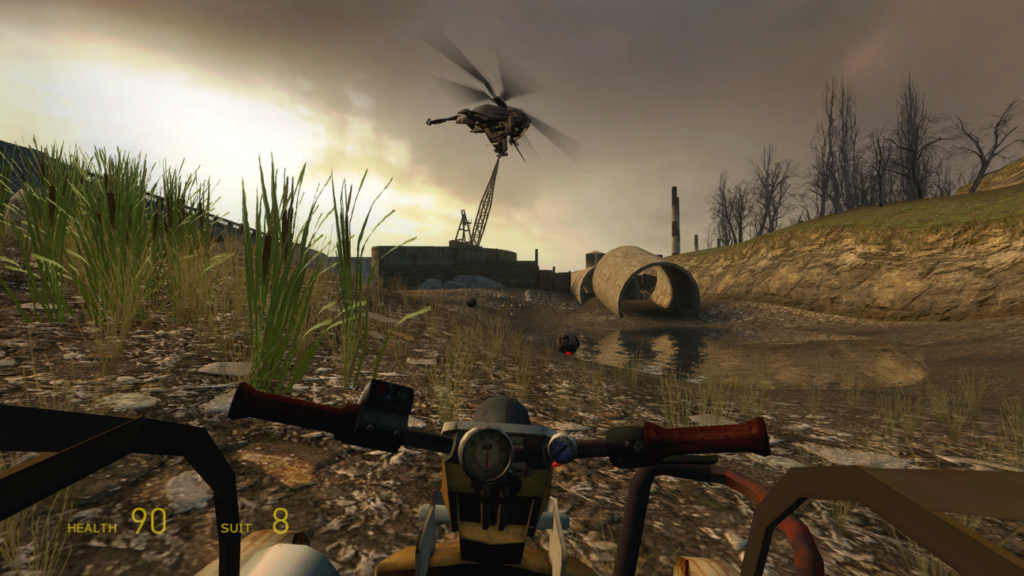
The airboat sequence was divisive in 2004, but this writer enjoyed it.
Credit:
Anna Washenko
Next I reach the Black Mesa East chapter, which is a perfect interlude. The game’s approach to world-building is probably the area where my feelings align most closely with those of Half-Life 2 veterans. It is spectacular. Heading down into the lab may be the best elevator ride I’ve taken in a game. Judith is talking science, and outside the shaft, I see humans and vortigaunts conducting fascinating experiments. Small vignettes like those are a perfect way to introduce more information about the rebellion. They give subtle context to a game that doesn’t do much to explain itself and doesn’t need to.
Also, Dog is the best boy. Seriously, I’ve seen modern games where the animations didn’t have as much personality as when Alyx treats her robot protector like an actual dog, and he shakes in delight. My only sadness is that Dog doesn’t accompany me to Ravenholm.
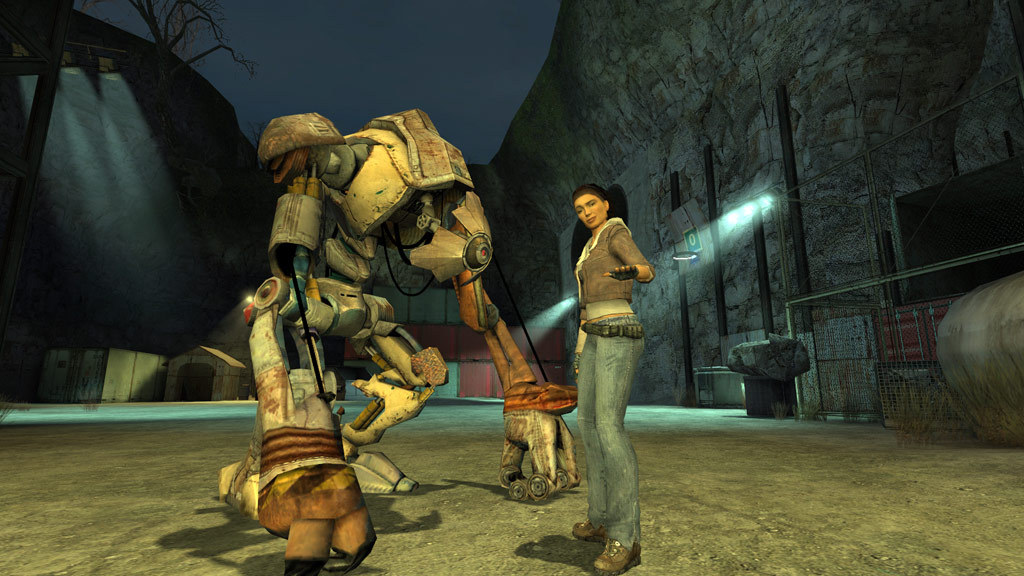
Dog is, in fact, the best boy.
Credit:
Valve
I do wish Dog had come with me to Ravenholm. I learned after the fact that this chapter is one of the most iconic and beloved, but I had the opposite reaction. Survival horror is not my jam. These whirling death traps are sweet, but I hate jump scares, and I don’t love any of my weapons for the encounters.
That brings me to something I don’t want to say, but in the spirit of journalistic honesty, I must: I don’t adore the Gravity Gun. Obviously it was the game’s signature creation here and probably what most of you recall most fondly, but I did not fully grasp its potential immediately. Based on the tutorial in Black Mesa East, I assumed it would mostly be a component to puzzle-solving and traversal rather than a key part of combat. I only started using it as a weapon in Ravenholm because I ran out of ammo for everything else.
It’s not that I don’t get the appeal. Slicing zombies up with a saw blade or bashing them with paint cans is satisfying—no complaints there. But I found the tool inconsistent, which discouraged me from experimenting as much as the developers may have hoped. I’m pretty sure I do as much damage to myself as to enemies trying to lob exploding barrels. I want to be able to fling corpses around and can’t (for reasons that became apparent later, but in the moment felt limiting). Later chapters reinforced my uncertainty, when I couldn’t pull a car to me, yet a push blast had enough power to overturn the vehicle.
And once again, I had a rough time with navigation. Maybe I was missing what other people would have seen as obvious cues, the way I’m attuned to finding climbing paths marked by color in modern games—controversial as that yellow marking convention may be, its absence is noted when you’re struggling to read the environment with a visual language for the game that emphasizes realism over readability. Or maybe I’ve gotten over-reliant on the tools of the sprawling RPGs I favor these days, where you have a mini-map and quest markers to help you manage all the threads. But for an agonizingly long time, I stared at an electrified fence and wires that seemed to lead to nowhere before realizing that I was supposed to enter the building where Father Grigori first appeared on the balcony. A giant bonfire of corpses out front seemed like a clear ‘do not enter’ sign, so it didn’t occur to me that I could go inside. Alas.
Speaking of which, Father Grigori is the best part of the section. He’s a total bro, giving me a shotgun at long last. I feel kind of bad when I just abandon him to his murderous flock at the end of the chapter. I hope he survives?
Familiarity and finding my footing
The new weapons are coming fast and furious now. I’m impressed at how good the combat feel is. I like the pulse rifle a lot, and that has become my go-to for most long-distance enemies. I wish I could aim down sights, but at least this feels impactful at range. Although I don’t usually favor the slow cadence of a revolver in other games, I also enjoy the magnum. The SMG serves well as a workhorse, while the rocket launcher and crossbow are satisfying tools when the right situation arises.
But my favorite weapon, far more than the Gravity Gun, is the shotgun. Especially at point-blank range and into a fast zombie’s head. Chef’s kiss. Maybe it’s my love of Doom (2016) peeking through, but any time I can go charging into a crowd with my shotgun, I’m a happy camper.
While the worldbuilding in Half-Life 2 is stellar, I don’t think the writing matches that high. Just about every brief encounter with allies starts with someone breathlessly gasping, “Gordon? Gordon Freeman?” It’s the sort of repetition that would make for an effective and dangerous drinking game.
I was surprised when I entered another vehicle section. I liked the airboat, even though the chapter ran a touch long, but this dune buggy feels a lot jankier. At least it starts with a gun attached.
I love the idea of this magnet crane puzzle. I wish it didn’t control like something from Octodad, but I do get my buggy up out of the sand.
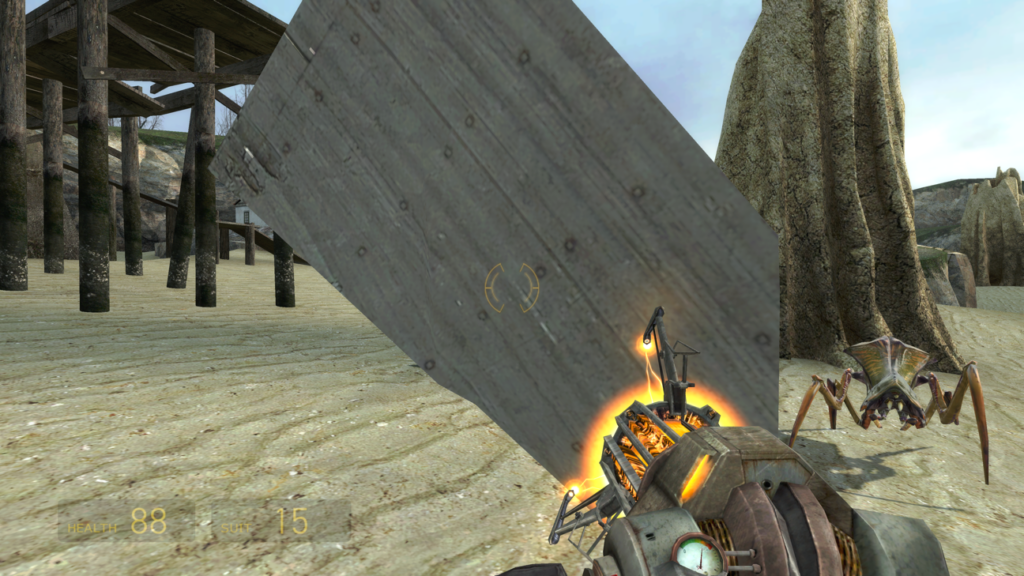
The “floor is lava” sequence involves placing objects with the Gravity Gun to avoid disturbing an army of angry antlions by stepping on the sand.
Credit:
Anna Washenko
Things start turning around for me once I reach the sandy version of ‘the floor is lava.’ That’s a cute idea. Although I keep wanting to rotate objects and have a more controlled placement with the Gravity Gun like I could when I did these kinds of tasks with the Ultrahand ability during The Legend of Zelda: Tears of the Kingdom. I understand that Half-Life 2 crawled so TotK could run, but that knowledge doesn’t mean I have a better time using the mechanic. Toward the end of the sequence, I got bored by the slow pace of creating a bridge and just barrelled ahead, willing to face a firefight just to move things along.
At this point, however, things take a decided turn for the better when I get my other favorite weapon of the game: My own antlion army! Commanding them is so fabulously ridiculous. The scene where hordes of antlions leap over high walls to attack gunmen on the towers leading into Nova Prospekt may be my favorite moment so far in the entire game. If this is how all of you felt flinging radiators around with the Gravity Gun back in the day, then I get why you love it so. I’m sure I won’t be able to keep this glorious power indefinitely, but I would happily finish the rest of the story with just antlions and a shotgun if they’d let me.
The Nova Prospekt area is the first time I really see a clear line connecting Half-Life 2 to Portal. None of the puzzles or characters thus far gave me Portal vibes, but I definitely get them here, especially once turrets come into play. By this point, I’m finally navigating the space with some confidence. That might be the result of logging enough hours or maybe it was just the sense that GLaDOS could start talking to me at any moment. Whatever the reason, I think I’m finding my groove at last.
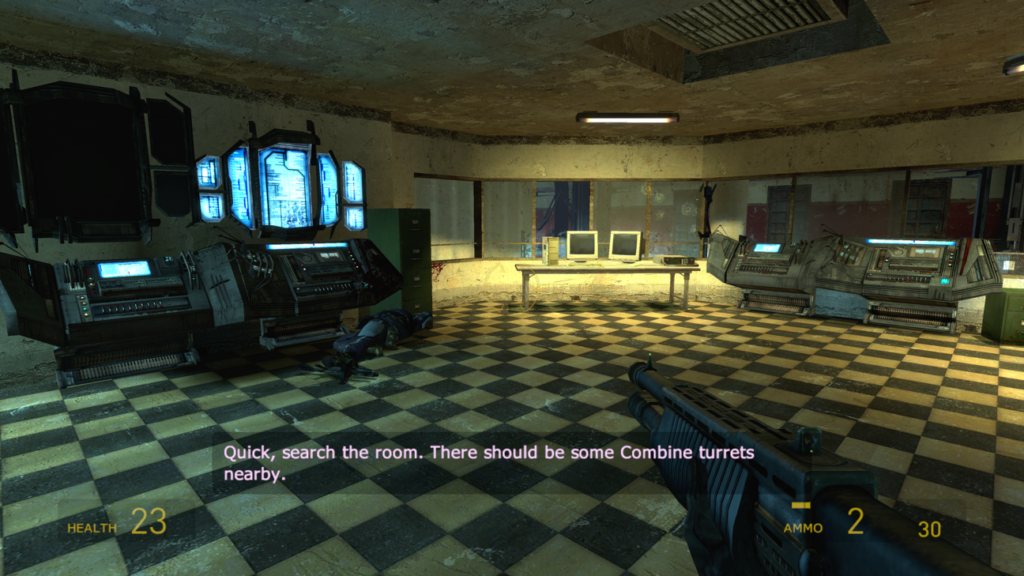
Nova Prospekt is one of the first areas Valve made when it developed Half-Life 2, so it’s not surprising it bears a lot of similarity to environments and vibes in both the original Half-Life and in Portal.
Credit:
Anna Washenko
Somehow I am not surprised by Judith’s sudden but inevitable betrayal in this chapter. Alyx not getting along with her in the Black Mesa East chapter felt pretty telling. But then she’s just going to let Judith enter teleport coordinates unsupervised? Alyx, you’re supposed to be smart!
What do you know—now Judith has re-kidnapped Eli. Color me shocked.
Onward and upward to the end
It’s nice having human minions. They’re no antlions, but I like how the world has shifted to a real uprising. It reminds me of the big charge at the end of Mass Effect 3, running and gunning through a bombed-out city with bug-like baddies overhead.
Snipers are not a welcome addition to the enemy roster. Not sure why Barney’s whining so much. You could throw some grenades, too, my dude.
Barney tags along with my minions as we reach the Overwatch Nexus. Destroying floor turrets is probably the first time I’ve struggled with combat. These are the least precise grenades of all time. Once we make it through the interior sequence, it’s time to face down the striders. I can’t imagine how you’d play this section bringing down the swarm of them on a harder difficulty. My health takes a beating as I run around the wreckage desperately looking for ammo reloads and medkits. In theory, this is probably a great setpiece, but I’m just stressed out. Things go a little better once the combat is paired with traversal, and the final showdown on the roof does feel like a gratifying close to a boss fight.
On to the Citadel. Why on earth would I get into one of these pods? That’s a terrible idea. But apparently that’s what I’m going to do. I hope I’m not supposed to be navigating this pod in any way, because I’m just taking in the vibes. It’s another transit moment with glimpses into what the enemies have been getting up to while the rebellion rages outside. It’s eerie; I like it.
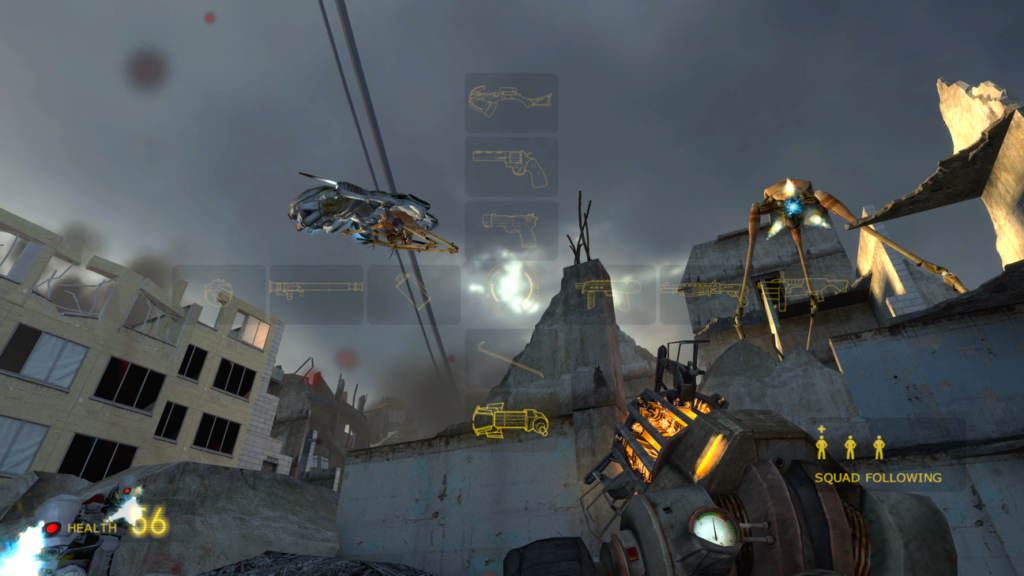
Battling the striders as the game moves toward its finale.
Credit:
Anna Washenko
The Gravity Gun is the core of Half-Life 2, so it makes sense that a supercharged version is all I have for the final push. I appreciate that I can use it to fling bodies, but my reaction is a little muted since this was an idea I’d had from the start. But I do find the new angle of sucking up energy orbs to be pretty rad.
I arrive in Dr. Breen’s office, and it looks grim for our heroes. Judith redeeming herself surprises me more than her betrayal, which is nice. When he runs off, I’m mentally preparing myself as I chase him for a final boss showdown. Surely, something extra bonkers with the Gravity Gun awaits me. I climb the teleportation tower, I pelt Breen’s device with energy orbs, I’m waiting for the other shoe to drop, and…
Huh?
Context is everything
In the moment, I was torn between feeling that the opaque ending was genius and that it was an absolute cop-out. It was certainly not how I expected the game to end.
But on reflection, that wound up being a fitting final thought as the credits rolled, because I think ‘expectations’ were at the heart of my conflicted reactions to finally playing Half-Life 2. I’ve rarely felt so much pressure to have a particular response. I wanted to love this game. I wanted to share the awe that so many players feel for it. I wanted to have an epic experience that matched the epic legacy Half-Life 2 has in gaming history.
I didn’t.
Instead, I had whiplash, swinging between moments of delight and stretches of being stymied or even downright pissed off. I was tense, often dreading rather than eagerly awaiting each next twist. Aside from a handful of high points, I’m not sure I’d say playing Half-Life 2 was fun.
As I mentioned at the start, the big question I felt I had to answer was whether Half-Life 2 felt relevant today or whether it only holds up under the rosy glow of nostalgia. And my answer is, “It depends.” As an enigmatic person once said, “The right man in the wrong place can make all the difference in the world.” It’s all in the context.
Moments that were jaw-dropping in 2004 have less impact for someone like me who’s played the many titles that copied, standardized, and perfected Half-Life 2‘s revelations. Intellectually, I understand that the Gravity Gun was a literal game-changer and that a physics engine deployed at this scale was unheard of. But funnily enough, a modern player is even less likely to see those innovations as so, well, innovative when a game has as much polish as Half-Life 2 does. Half-Life 2 has almost no rough edges in the execution. Everything works the way it was intended.
Since that polish means the new ideas don’t feel like experiments, and since I’ve seen them in other games in the intervening years, they don’t register as notable.
Just as you don’t need to be a fan of Aristotle’s Poetics to appreciate drama, you don’t need to love Half-Life 2 to appreciate its legacy. As a fun game to play, whether it holds up will come down to you and your context. However, as a showcase of the technology of the time and a masterclass in world-building, yes, Half-Life 2 holds up today.
